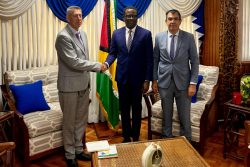HAVANA, (Reuters) – President Raul Castro will serve up to five more years as head of Cuba’s Communist Party as he and other aging revolutionaries keep their grip on power at a time of economic reform and detente with the United States.
The Communist Party announced the result of internal elections yesterday. Wrestling with economic change and transition from the generation that toppled a U.S.-backed government in 1959, the party wants to avoid any chaotic shake-up within its leadership ranks.
Speaking at the closure of a four-day party congress, Castro, 84, signaled he and his fellow octogenarian No. 2 would step aside sometime before the next such meeting in five years.
“This seventh congress will be the last one led by the historic generation,” Castro said, at the closing ceremony where delegates gave his older brother, former president and revolutionary leader Fidel Castro, 89, a roaring ovation.
In an admission of mortality, the elder Castro startled Cubans used to his towering presence over the island’s politics since he was a young man.
“Soon I will be 90 years old,” he said. “Soon I will be like all the rest. Our turn comes to all of us,” the now frail former leader said in his most extensive public appearance in years.
Raul Castro had proposed an age limit of 70 for top officials as the party gathered for the start of the congress over the weekend, raising expectations veterans would begin to step aside. But he said the next five years would be for transition and such rules would not be fully applied until then.
The congress is not due to reconvene until 2021. Castro steps down as Cuba’s president in 2018 and when he does he could either remain in the more powerful role as head of the party or retire from that post as well.
The congress backed steps toward more foreign investment and a growing private sector of small businesses, but few details of new measures to free up the economy were revealed and Castro made clear that such changes would not be rushed.
“(We will) introduce the necessary changes, without hurry and with no improvisation, which would only lead to failure,” he said.
At the end of the congress, the first since 2011, the Communist Party said Castro had been re-elected as first secretary, with Jose Ramon Machado Ventura, 85, re-elected as second secretary.
Machado Ventura, a doctor, fought alongside Fidel and Ernesto “Che” Guevara in their 1950s rebellion. He is seen as a ideological hard-liner who has sought to slow a move to market economics, leading a campaign to reintroduce price controls after an inflation spike at the end of last year.
The two men are close, but Castro is seen as more of a pragmatist who built Cuba’s army and brought efficient management to some of the military’s powerful companies during long years in the shadow of his brother Fidel, who ruled the country until 2008.
The younger Castro ordered market reforms to the economy and oversaw the thaw with the United States that led Barack Obama to become the first U.S. president to visit Cuba in 88 years.
Since that historic visit last month, the brothers have hardened anti-U.S. rhetoric and raised political defences out of a stated concern Washington plans to topple them.
Under Castro, Internet usage has slowly grown in one of the world’s least connected countries, and Cubans are more open in expressing political views. But the congress made no political concessions, reaffirming the importance of a one-party state.
After encouraging self-employment to lower the state’s responsibilities at the last congress, about half a million Cubans now work for themselves or for small private businesses, forming a growing middle class.
Only a fifth of planned reforms have been fully implemented and there is growing irritation more has not been done, with thousands of young Cubans taking advantage of new travel freedoms to leave for good.
While top posts were unchanged, the party brought in five mostly younger faces to the powerful political bureau. In an attempt to diversify the mostly white, male bureau, the new members included three women. Two were of mixed Afro-Cuban descent.
Arturo Lopez-Levy, who teaches Latin American politics at Texas University, likened Castro’s moves to defensive driving as he seeks to maintain Cuba’s single-party political system.
“Castro expressed a desire to broaden the scope of the reforms and speed up their implementation, but he wants to preserve a cushion space for maneuver and reverse,” Lopez-Levy said.
Younger faces include Miguel Diaz-Canel, 55, who as first vice president of the country is widely seen as Raul Castro’s successor. He was re-elected to a senior position in the party but was not promoted.







